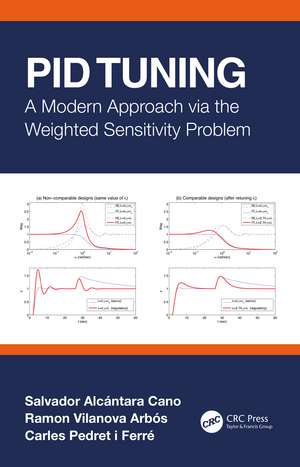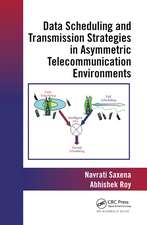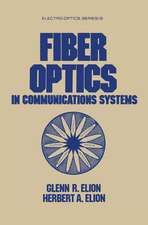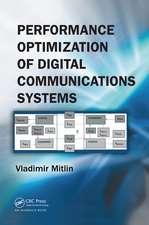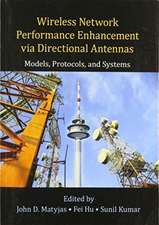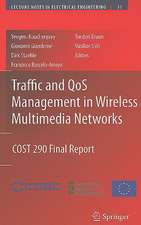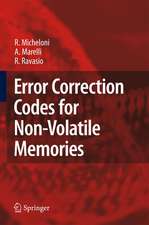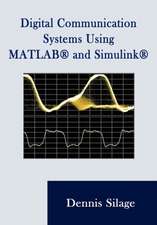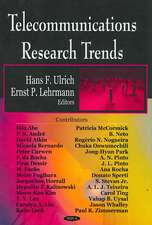PID Tuning: A Modern Approach via the Weighted Sensitivity Problem
Autor Salvador Alcántara Cano, Ramon Vilanova Arbós, Carles Pedret i Ferréen Limba Engleză Hardback – 20 noi 2020
The PID controller is the most common option in the realm of control applications and is dominant in the process control industry. Among the related analytical methods, Internal Model Control (IMC) has gained remarkable industrial acceptance due to its robust nature and good set-point responses. However, the traditional application of IMC results in poor load disturbance rejection for lag-dominant and integrating plants. This book presents an IMC-like design method which avoids this common pitfall and is devised to work well for plants of modest complexity, for which analytical PID tuning is plausible. For simplicity, the design only focuses on the closed-loop sensitivity function, including formulations for the H∞ and H2 norms. Aimed at graduate students and researchers in control engineering, this book:
- Considers both the robustness/performance and the servo/regulation trade-offs
- Presents a systematic, optimization-based approach, ultimately leading to well-motivated, model-based, and analytically derived tuning rules
- Shows how to tune PID controllers in a unified way, encompassing stable, integrating, and unstable processes
- Finds in the Weighted Sensitivity Problem the sweet spot of robust, optimal, and PID control
- Provides a common analytical framework that generalizes existing tuning proposals
| Toate formatele și edițiile | Preț | Express |
|---|---|---|
| Paperback (1) | 428.85 lei 6-8 săpt. | |
| CRC Press – 25 sep 2023 | 428.85 lei 6-8 săpt. | |
| Hardback (1) | 783.73 lei 6-8 săpt. | |
| CRC Press – 20 noi 2020 | 783.73 lei 6-8 săpt. |
Preț: 783.73 lei
Preț vechi: 955.76 lei
-18% Nou
149.97€ • 157.70$ • 123.92£
Carte tipărită la comandă
Livrare economică 16-30 aprilie
Specificații
ISBN-10: 036734372X
Pagini: 154
Ilustrații: 20 Tables, black and white; 74 Illustrations, black and white
Dimensiuni: 178 x 254 x 11 mm
Greutate: 0.49 kg
Ediția:1
Editura: CRC Press
Colecția CRC Press
Cuprins
Notă biografică
Ramon Vilanova Arbós graduated from the Universitat Autònoma de Barcelona (1991), obtaining the title of Doctor through the same university (1996). At present, he's Full Professor of Automatic Control and Systems Engineering at the School of Engineering of the Universitat Autònoma de Barcelona where he develops educational task-teaching subjects of Signals and Systems, Automatic Control, and Technology of Automated Systems. His research interests include methods of tuning of PID regulators, systems with uncertainty, analysis of control systems with several degrees of freedom, applications to environmental systems, and development of methodologies for the design of machine-man interfaces. He is an author of several book chapters and has more than 100 publications in international congresses/journals. He is a member of IFAC and IEEE-IES. He's also a member of the Technical Committee on Factory Automation.
Carles Pedret i Ferré was born in Tarragona, Spain, on January 29, 1972. He received the BSc degree in Electronic Engineering and the PhD degree in System Engineering and Automation from Universitat Autònoma de Barcelona, in 1997 and 2003, respectively. He is Associate Professor at the Department of Telecommunications and System Engineering of Universitat Autònoma de Barcelona. His research interests are in uncertain systems, time-delay systems, and PID control.
Descriere
The PID controller is the most common option in the realm of control applications and is dominant in the process control industry. Among the related analytical methods, Internal Model Control (IMC) has gained remarkable industrial acceptance due to its robust nature and good set-point responses. However, the traditional application of IMC results in poor load disturbance rejection for lag-dominant and integrating plants. This book presents an IMC-like design method which avoids this common pitfall and is devised to work well for plants of modest complexity, for which analytical PID tuning is plausible. For simplicity, the design only focuses on the closed-loop sensitivity function, including formulations for the H∞ and H2 norms. Aimed at graduate students and researchers in control engineering, this book:
- Considers both the robustness/performance and the servo/regulation trade-offs
- Presents a systematic, optimization-based approach, ultimately leading to well-motivated, model-based, and analytically derived tuning rules
- Shows how to tune PID controllers in a unified way, encompassing stable, integrating, and unstable processes
- Finds in the Weighted Sensitivity Problem the sweet spot of robust, optimal, and PID control
- Provides a common analytical framework that generalizes existing tuning proposals
